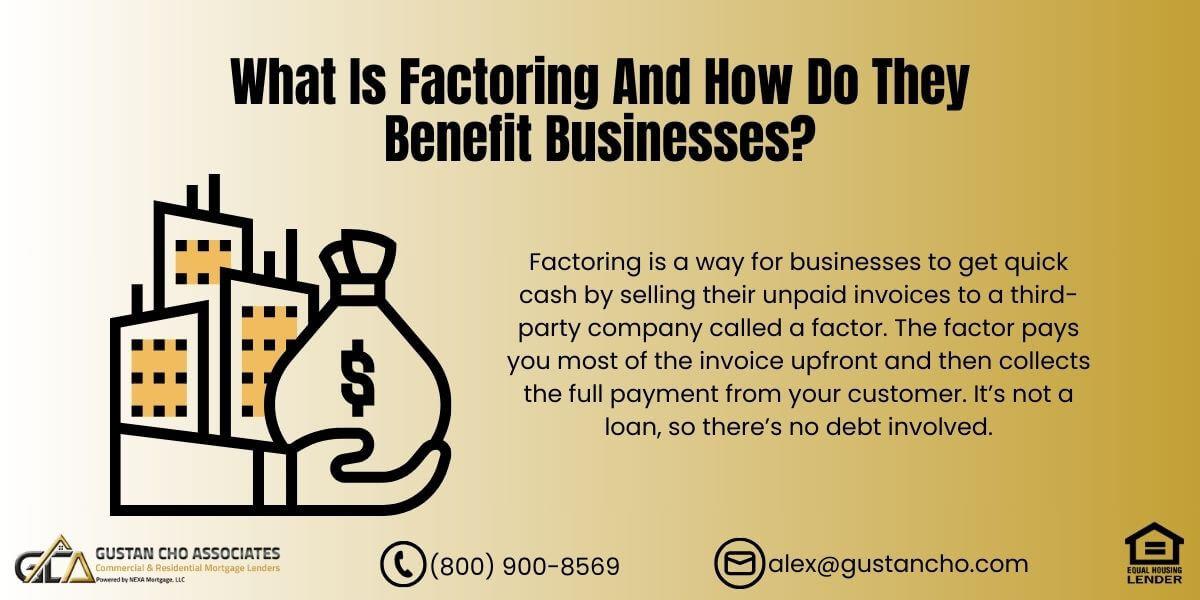What Is Factoring and How Does It Help Businesses in 2024?
Running a business can feel like a juggling act—managing operations, paying employees, and staying competitive. Cash flow often becomes the biggest challenge. That’s where factoring comes in. But what is factoring, and how does it work? How can it help businesses thrive in today’s fast-paced economy?
This guide will explain factoring in simple terms, walk you through how it works, and outline its benefits. Whether you’re a business owner looking to free up cash flow or someone curious about financial tools, this article will provide everything you need to know about factoring in 2024.
What Is Factoring? A Simple Explanation
Factoring is a way for businesses to get cash quickly. Businesses do this by selling their unpaid invoices (money owed to them) to another company, called a factor. Instead of waiting weeks—or even months—for customers to pay, the factor pays the business a percentage of the invoice amount upfront. The factor then collects the full payment from the customer later.
It’s important to note that factoring isn’t a loan. You’re not borrowing money; you’re selling a financial asset—your invoices. This makes factoring a flexible option for businesses that need immediate funds without taking on new debt.
How Does Factoring Work? A Step-by-Step Breakdown
Factoring is simple once you understand the steps. Here’s how it works:
- You Provide Goods or Services: As is customary, your company provides products or services to a client.
- You Issue an Invoice: You send the customer an invoice with payment terms, such as 30 or 60 days.
- You Sell the Invoice to a Factor: Instead of waiting for the customer to pay, you sell the invoice to a factoring company. They pay you a percentage of the invoice upfront, typically 70–90%.
- The Factor Collects Payment: The factoring company collects the full payment directly from your customer.
- You Get the Remainder: Once the customer pays, the factory deducts their fees and sends you the remaining balance.
Example: Suppose you issue a $10,000 invoice with 60-day terms. A factoring company offers you 85% upfront. You’ll receive $8,500 within 24–48 hours. When your customer pays the full $10,000, the factor deducts their fees (e.g., $500) and sends you the remaining $1,000.
Need Cash Flow Fast? Unlock the Power of Factoring for Your Business!
Contact us today to learn how factoring can support your business growth and provide the working capital you need.
Why Do Businesses Use Factoring?
Factoring helps businesses in industries where delayed payments are common. Here are the main reasons companies choose factoring:
- Cash Flow Relief: Waiting for invoices to be paid can create a cash flow crunch. Factoring gives you quick access to cash to keep operations running smoothly.
- No Debt: Unlike loans, factoring doesn’t add to your liabilities or affect your credit.
- Focus on Growth: With immediate cash in hand, you can invest in growth—whether it’s buying new equipment, expanding your team, or taking on bigger projects.
- Flexibility: Factoring adapts to your needs. Your funding potential increases as your business grows and you issue more invoices.
Who Can Benefit From Factoring?
Factoring is ideal for businesses across various industries, especially those that deal with delayed payments. Here are some examples:
- Trucking and Transportation: Cash is essential for fuel, repairs, and payroll. Factoring ensures these businesses stay on the road.
- Manufacturing: Businesses need funds to buy raw materials and keep production lines moving.
- Healthcare Providers: Medical practices often wait months for insurance reimbursements. Factoring bridges the gap.
- Staffing Agencies: Agencies must pay employees regularly, even if clients take weeks to pay their invoices.
Factoring in 2024: What’s New?
The factoring industry has evolved with technology. Here are the latest trends and updates for 2024:
- Digital Platforms: Many factoring companies now offer online platforms where businesses can submit invoices and track payments in real-time. This makes the process faster and more transparent.
- AI-Powered Credit Analysis: Factors are using AI to assess customer creditworthiness quickly, making it easier to approve funding.
- Flexible Fee Structures: Competition among factoring companies has led to more competitive rates and customizable fee structures.
- Broader Accessibility: More small businesses and startups use factoring thanks to reduced minimum invoice requirements.
Factoring vs. Loans: What’s the Difference?
It’s easy to confuse factoring with loans, but they’re very different financial tools:
- Factoring:
- You sell invoices for immediate cash.
- No repayment is required.
- Approval is based on your customer’s creditworthiness, not yours.
- Loans:
- You borrow money and must repay it with interest.
- Approval depends on your credit history and financials.
- Adds debt to your balance sheet.
Factoring is often better for businesses with inconsistent cash flow or limited credit history.
How Much Does Factoring Cost?
Factoring fees vary depending on the company and the industry. On average, factoring costs range from 1% to 5% of the invoice value per month. Factors consider the following when determining fees:
- Customer Creditworthiness: Better-paying customers mean lower fees.
- Invoice Volume: Higher volumes often lead to discounts.
- Industry Risk: Some industries are riskier, leading to higher fees.
The Benefits of Factoring
Factoring offers numerous benefits that can help businesses stay competitive and grow:
- Improved Cash Flow: With quick access to cash, you can cover expenses like payroll, inventory, and utilities without delays.
- No Debt Burden: Since factoring isn’t a loan, it doesn’t add debt to your books, keeping your financials clean.
- Credit Flexibility: Approval is determined by the creditworthiness of your customers, not your own. Businesses with poor credit may still be eligible.
- Operational Efficiency: Factoring companies often handle collections, freeing your team to focus on core operations.
How to Choose a Factoring Company
Not all factoring companies are the same. Here’s what to consider:
- Fees: Compare rates and ask about hidden charges.
- Funding Speed: Look for companies that provide funding within 24–48 hours.
- Customer Support: Choose a partner that offers reliable communication and support.
- Industry Expertise: Some factors specialize in specific industries, which can be advantageous.
Ready to Get Paid Faster? Learn How Factoring Can Help Your Business!
Contact us today to discuss how factoring can improve your cash flow and boost your business operations.
How Factoring Can Help You Buy a Home
If you’re a business owner, factoring doesn’t just improve your cash flow—it can also help you qualify for a mortgage. Here’s how:
- Debt-Free Funding: Because factoring isn’t a loan, it doesn’t increase your debt-to-income ratio, which is a key factor in mortgage approval.
- Improved Credit: By stabilizing cash flow, factoring helps you pay bills on time, boosting your credit score.
- More Savings: Immediate access to cash means you can build your down payment faster.
If you are considering purchasing or refinancing a house, factoring could be the financial solution that accelerates your journey to becoming a homeowner.
Take Control of Your Cash Flow Today
Factoring is an effective financial instrument for companies seeking immediate cash flow without incurring debt. In 2024, factoring is more flexible, accessible, and tech-driven than ever, making it an ideal solution for businesses of all sizes.
If you’re a business owner looking to stabilize your finances or ready to purchase or refinance a home, contact us today. At Gustan Cho Associates, we specialize in helping borrowers and business owners navigate their financial options. Call us at 800-900-8569 or email us at gcho@gustancho.com for expert guidance.
Let’s make your financial goals a reality.
Frequently Asked Questions About What is Factoring?
Q: What is Factoring, and How Does it Work?
A: Factoring is a way for businesses to get quick cash by selling their unpaid invoices to a third-party company called a factor. The factor pays you most of the invoice upfront and then collects the full payment from your customer. It’s not a loan, so there’s no debt involved.
Q: Why do Businesses Use Factoring Instead of Loans?
A: Factoring isn’t a loan, so it doesn’t add debt to your business. It’s based on your customer’s credit, not yours. This simplifies the process for companies with low credit ratings or irregular cash flow to secure the funds they need.
Q: How Fast Can I Get Money Through Factoring?
A: Most factoring companies provide funding within 24–48 hours of approving your invoices. This speed makes it ideal for businesses that need cash immediately to cover expenses.
Q: Does Factoring Affect My Business’s Credit Score?
A: No, factoring doesn’t impact your credit score. The factor evaluates your customers’ creditworthiness, not yours. This means you can still qualify for factoring even if your business credit is less than perfect.
Q: What is Factoring, and Why is it Better for Cash Flow?
A: Factoring helps you get cash quickly from unpaid invoices. Instead of waiting 30, 60, or 90 days for customer payments, you can immediately use that cash. This allows you to pay employees, buy inventory, or invest in growth.
Q: What Industries Benefit the Most from Factoring?
A: Many industries use factoring, especially those with delayed payment cycles. Examples include trucking, manufacturing, healthcare, staffing agencies, and government contractors.
Q: How Much Does Factoring Cost?
A: Factoring charges usually vary between 1% and 5% of the monthly invoice amount. The exact cost depends on factors like your customers’ credit, the size of your invoices, and your industry.
Q: What is Factoring, and Can Startups Use it?
A: Factoring is an option for startups as well as established businesses. Since approval is based on your customers’ credit, businesses with limited operating history can qualify for factoring services.
Q: How is Factoring Different in 2024 Compared to the Past?
A: In 2024, factoring will be more accessible than ever. Digital platforms let you submit invoices online, track payments in real-time, and get faster approvals. AI tools also make it easier for factoring companies to evaluate customer credit quickly.
Q: Can Factoring Help Me Wualify for a Mortgage?
A: Yes! Since factoring isn’t a loan, it doesn’t increase your debt-to-income ratio—a key factor in mortgage approval. Factoring can also stabilize your cash flow, helping you pay bills on time and boost your credit score. This can make it easier to buy or refinance a home.
This blog about “What Is Factoring And How Do They Benefit Businesses” was updated on November 22nd, 2024.
Boost Your Cash Flow with Factoring—Find Out How It Works for Your Business!
Contact us today to learn how factoring can help your business grow and maintain cash flow.








